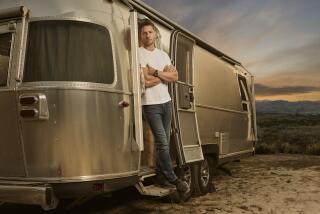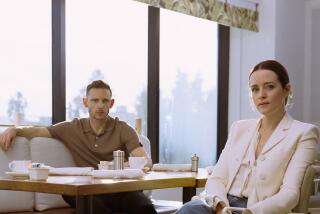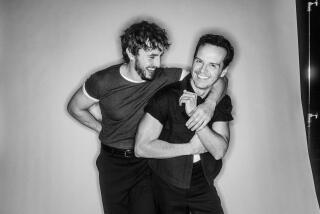What happens when you get Mandy Moore, Angela Bassett and other actors together? Just watch
It’s the kind of ensemble that would make for a most epic cross-over TV episode. The Envelope gathered six actors who keep viewers glued to their screens (whichever form that may take) each week — Angela Bassett, who plays a police officer with a fractured home life on Fox’s “9-1-1”; Darren Criss, who plays killer Andrew Cunanan in FX’s “The Assassination of Gianni Versace: American Crime Story”; Jonathan Groff, who portrays an FBI agent and criminal profiler in Netflix’s “Mindhunter”; Maggie Gyllenhaal, who plays a prostitute-turned-porn producer in HBO’s “The Deuce”; David Harbour, who stars as a gruff and tortured police chief in Netflix’s “Stranger Things”; and Mandy Moore, who plays America’s favorite time-jumping matriarch on NBC’s “This Is Us” — to discuss their craft. Which they did, at some length, but not without also covering secrets on set, cynicism and the lessons of “Gilligan’s Island.”
Here is an excerpt from their conversation, edited for length and clarity.
How did these roles for you challenge your comfort zone?
Darren Criss: This was the first time I had a real leading position. So the challenge was less about the content of the role and more about the workload itself. And that is exciting because it’s fun to be in a position to sort of set a tone, in a crew and in a set.
Maggie Gyllenhaal: I feel like I want it to be difficult, especially if it’s a long thing. This is many hours. I don’t want to take on something that feels like territory I’ve already been in. Also, the roles that interest me are the ones where it feels like they’re kind of on the edge of what I know about myself. Like there’s something that I will have to learn about myself in order to play the role well and I think I was interested at the time — it was a long time ago that we shot the pilot — but I was interested in sexuality, femininity, power, commerce and I think it seems to be like everyone else was interested in that a few years ago, too, because now it’s all over the place.
MORE: Milo Ventimiglia, Michelle Yeoh and more TV stars break down their devastating death scenes »
David Harbour: I know you probably can’t sum it up, but what did you learn about yourself?
Gyllenhaal: What I learned about myself isn’t like, “And I learned that such and such,” a sentence, you know —
Harbour: There’s got to be something, though. I actually think you’re deflecting the question.
Gyllenhaal: OK, OK. [chuckles] I learned about myself that I am like way more hungry for like all sorts of things. I’m not satisfied —
Harbour: I love that.
Maggie Gyllenhaal: It’s the same as [my character] Candy —
Harbour: That’s a great answer.
Gyllenhaal: ...I’m hungry. I want more, like artistically, in terms of what you feel entitled to, what I feel entitled to as a woman, as an artist, as a — like that’s all over what happened for her and I mean, it’s definitely true for me too.
Harbour: I’ll — in the spirit of —
Gyllenhaal: Fairness?
Harbour: — camaraderie and fairness, I will reveal that I learned a lot about myself, as well, in terms of things that were not very pleasant. Like I learned about my own arrogance. I learned about the way that I use charm to deflect things and how thin that can be sometimes. I learned about all these qualities of myself that are sort of weak covers, that were necessary for the character and were kind of great to play but I learned that they were not so difficult for me to play. It’s very interesting to discover stuff about yourself that isn’t always romantic and good. Like there’s lots of strength that I uncovered, as well, but there’s also these qualities where you’re like, “Oh, yeah, I’m not what I see myself as.”
Gyllenhaal: I’m going into doing the second season and I have never done that before, played the same character over a period of time and I feel like my character learned the same things I learned. Did your character learn the same things that you learned?
Harbour: The construct of TV is like “Gilligan’s Island,” you always show up on the island in the red shirt, so you’re always the same guy. So you’re going to have to take a different journey. The impulse is let’s just do the same thing, bring out all the hits and have him be adorable and then grow to love him — but you can’t do that. So I was very conscious starting the second season that this has to be a totally different journey, an arc.
WATCH: Video Q&A’s from this season’s hottest contenders »
Criss: Do you think writers are cognizant of that? For all of us that have done multiple seasons of stuff, we’re all like, “Man, I really hope we’re not pulling out the same hits,” or maybe enough of the hits, or do you find yourself in the driver’s seat being like, “Look, we really would like it if we can do X, Y and Z as opposed to 1, 2 and 3.” Do you feel in control of that?
Mandy Moore: Well, the trick of our show is it’s not linear. Like I play a character from 22 to 67. So I play all of these different —
Criss: Wow. You look great!
Moore: Yeah, four hours of prosthetics is intense. I’m really the only actor on the show that does that. Before we started, we sort of got a general macro idea of the life of this family and what sort of happens. Because the actors present-day who play our children have to know obviously what happened in their lives as kids and teenagers because it fundamentally affects who they are and the choices that they make as they get older. So it’s different. It’s tricky.
Do you guys like knowing where your character is going or do you like to be surprised just as they would be surprised by whatever life events happen?
Angela Bassett: I like being surprised. We’re going into Season 2 but having worked with the Ryan Murphy camp, you’re just doing different characters year to year and different story lines. Sometimes you would get the script maybe two weeks before you start shooting. So it really was a faith walk, you know? And you just read and you’re like [gasp] and throw it down, walk around. OK, I’ve got to do it. Process it and come back. So, I don’t mind that spontaneity in finding out.
Jonathan, I imagine you knew ahead of time where the trajectory was going for the first season?
Jonathan Groff: Yeah, we did. We had all the scripts right at the beginning and we read through all of them. But I feel like I like to know the general arc of where you’re heading and it was great to have those read-throughs but I like the spontaneity of being on-set. For example, David Fincher, our director, when he was directing because he was sort of the mastermind behind the whole thing and it was this way with Ryan, too, actually on “Glee” — when the mastermind is on set and you’re in the moment doing what you’re doing and it starts to change and evolve as it’s happening. David would think of lines to write in the moment and things would happen in scenes in the moment. So the arc was always the same but I love the spontaneity in the moment.
So talk a little bit about where you were at in your career when these roles came up for you? I know, Mandy, you have a story.
Moore: I had done three failed pilots and I was like, “Well, maybe this acting thing is not for me anymore.” I’ve been doing this since I was 15. I’m 33 now. So I was like, “It’s been a good run.” You know? Maybe I’d go back to Florida where I grew up and go back to school or do music again or something. But I just couldn’t. I mean, you guys know as actors, it’s like I couldn’t find traction and I was just anxiously waiting for someone to give me the opportunity to be an adult, to be a woman and not be a little kid anymore. And thank goodness for Dan Fogelman and for this opportunity. I read the script and I was like, “I am Rebecca.” And I had no idea. It was just a pilot and it was in the middle of a weird time, it wasn’t even pilot season. And you only read the first episode, so I had no idea that this was the matriarch of the family and just how big and momentous her story would sort of be.
Gyllenhaal: Did they offer it to you? Did he also see you as this part?
Moore: I auditioned and I waited for like six weeks until I got a call that like yeah, they had gone to New York and read a bunch of other people and then there were a group of us going in for a chemistry read and there were three guys and three girls. So no, it was the audition process but I had known Dan Fogelman from this Disney movie “Tangled” that we had done together. He wrote it.
Criss: Oh, so good! I was hoping you’d mention it.
Gyllenhaal: I think it’s really interesting what comes to you when. It’s sort of trippy. Sometimes you’re like, “Why are they calling me for all of these divorced cops,” or something and I’m like, “I’m not into that. I don’t want to play that,” you know? And then out of that comes someone who sees you, someone who’s like, “I actually think you should play...” a street hooker or whatever and you’re like, “Yes. You see me.”
Criss: For whatever reason, the alchemy of the moment and the people in your life kind of bring you to these particular peaks and valleys. And you were saying the opportunity thing. You know, I keep telling folks that I’ve known forever, actors are only as good as the moments we’re given. We’ve been the same tools in the same toolbox for years and you’re like, “Use me, I’m here!” And all these characters that we’ve played have been within us our entire lives and it’s just a matter of somebody seeing past what you had just done and give you these opportunities.
Harbour: I don’t know that I agree with the idea that the characters are always within me. I don’t think I could have played this guy before four years ago. I don’t think I was ready, I don’t think I was the guy at all. It sort of came at a point in my life when I was ready to go to work in a different way. I mean, I’m a lot older than you, so I’ve been in lots of different phases in this business. So I’ve had periods where I felt pretty inspired and good about what I did and then I’ve had periods of true cynicism and just showing up and being like, “Whatever.” So I think that that’s sort of the alchemy or the kismet of it is it sort of came to me at a place where I was so tired of being cynical. It all sort of came together where it came to me but also I was like, “I’m going to go to work in a different way. I’m going to actually invest in this in a way that I haven’t in a long time.
Gyllenhaal: I was thinking about that recently, about what it means to have a point-of-view.
Groff: You mean, like your take on the character, like the choices you were making in the development process or in the moment of—
Gyllenhaal: Yeah, like what is this scene about for me. Like how do you work? How do you sit by yourself and work? Do you … well, you have to learn your lines. I mean, I just don’t understand when people come to work without their lines learned. I really don’t. But you learn your lines and then what do you do? I’ve recently figured out what you do is you go, “What is this scene about?” You don’t have to wait for someone else —
Bassett: And maybe that’s from more in television and film. As you say, you work alone. You know, you’re doing a lot of your work yourself, as opposed to if you’re in the theater where you come every day and working with others and you’re really working it out and discovering and changing and trying something different the next day and the next week and you know, it’s maturing. In television and film, you do a lot of your work on your — unfortunately — at home, yourself and then bring it and shoot it that day and hope that’s the best you had today to offer. And tomorrow when I know more, I could have given more but we’ve shot it already. So ...
Harbour: To have a conscious process in front of it is something that I hadn’t realized until I was 35.
Groff: It’s so hard for me to quantify point-of-view as a specific thing because it feels so amorphous and different with every director, even every day. Where sometimes I feel like I can communicate point-of-view and then sometimes I feel like what are we doing? I have no idea.
Gyllenhaal: I don’t think it’s a good idea to tell anybody about what your point-of-view is.
Moore: It’s just for you to know.
Harbour: Yeah, totally agree. Being an artist is a bit of being like a bad student, like being kind of a punk, I think or being a thief or something. Like there’s a bit of a secrecy about it that can be enlivening and super-fun when you’re playing it.
How much of when you’re deciding to take on a role is it about the role, how much is it about who you’ll be working with?
Bassett: For me it was just staying home. You know, because I have young kids.
Gyllenhaal: How old are your kids?
Bassett: They’re 12 now. I could have gone to Canada to shoot something else, but then the opportunity to come home and work with Ryan and Tim Minear and Brad Falchuk and having the history [with them]. Because as I said, there was no script. There was just this idea of what it might be. I don’t know if I would have been more intent about doing that if I had not worked with them before for four years and seen how they write for you. So it was a lot of things that time. But sometimes it’s the director, a lot of times it’s the cast or something I feel in the story that I want to say in the world.
Gyllenhaal: So what was the thing for you that you believed in and wanted to say in the world?
Bassett: I liked the idea of this strength juxtaposed against vulnerability. How we fall apart and how we pull ourselves back together or not. But usually the strength of character, how we do that. And in this, it’s this family relationship and it mirrors society and it’s how we’re going to deal with it and raise these children.
What has fascinated you about the world you were inhabiting with this character?
Groff: What’s weird is that what fascinated me even more than the real-life stories of the serial killers was the psychology of how to talk to people and how to get them to open up. And the whole show is basically — it is about serial killers and the FBI in the late ‘70s but there’s no action and it’s all just people in rooms talking. And one of the things that drew me to it initially was the scenes felt like scenes from a play because they were 10 pages long and incredibly psychological. So, learning how to mirror people, learning how to ask the right questions and just the psychology of getting people to open up.
More to Read
From the Oscars to the Emmys.
Get the Envelope newsletter for exclusive awards season coverage, behind-the-scenes stories from the Envelope podcast and columnist Glenn Whipp’s must-read analysis.
You may occasionally receive promotional content from the Los Angeles Times.







